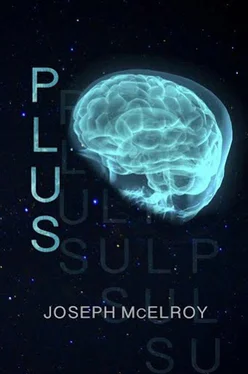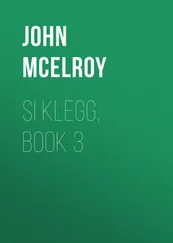That must not stop.
Plantward in one tube ran two kinds from himself: first, the spinning units each one a small shell of micro-orbits held between two equally larger shells of micro-orbits; and second, the spindles — spindles spun of glancing knots radiating sun.
Sun he’d first thought glanced wildly because it was the great Sun caught in the tube track, then later because it was his own sun radiating force against its vegetable journey; but now Imp Plus saw the spindles were his own sun bombing the clear canal of plantward tube to rebraid with the lost joints of Sun quanta, and then he found that in the race plantward some spindle-radii did draw the other Sun into the tube track to rebraid, while some did this upon reaching the plants, and some others of the red and amber-gold spindle-radii of his myriad did not rebraid but, reaching the plant beds, hit the algae in a spray, shredding green and light from the damp plants into circles he had not seen till now and did not want to stop to dwell on.
Except to see that the red and amber-gold frequencies of this sun of his had been for a long time observable across the growing dispersion of the once-fiery gland’s once-central glow.
He did not care.
The thought came all of a sudden.
So much so that the motions of the wendings increased to a steady spiral as if speed changed kind. Then he did not care.
But the spiral oscillated. The thought of this colored its cause like a radius sweeping and fading, sweeping, fading, so that seeing himself whole he could say he was alone , and hence did not care for connections. Ground would say, “It looks like a starfish becoming a rainbow shoe, a featherless bird becoming a gland, a body becoming an orbit.” But Ground would not know what had happened.
The Acrid Voice had argued against video monitors inside the capsule.
Imp Plus did not care. They had wanted a life form to support, that they could afford to lose. A brain becoming information.
He and the silent Sun had folded to fool them, was that it? He did not care but could not rest. What he saw here had caused him pain.
Had cost him .
He let his sight multiply. So an amber-scaled shearow in its peninsular leap paused, or seemed to pause, in mid-reach and drooped long margins of blue tissue that returned to the more sluggish and productive faldoreams like neurons to their earlier selves, while morphogens bounding onto, but up from, the axes of the wendings touched shearow-leaps and faldoream-causeways to draw them among the wendings.
And the wendings in the solid of their spiral up and down yet as well under the full reach of multi-sight that Imp Plus relented into, gathered radiance of motion into a fixity like his own orbit: or, beyond his orbit, a possibility he wanted not to think of.
Wanted not to think of.
Was what he was. For Ground, for Project Travel Light, for the Good Voice.
Wanted, he had been. So then they would not have to think of him. Which led to a possibility he wanted not to think of.
Wanted not to think of.
But think or not, he had to see what now went on. Why had he to see, why attend? Words stalled into opposition, and his substance could have become morphogens freed from the axial plasm of the wendings, for he almost saw himself — itself a changing thought — wholly parted into all possible parts, divisor and dividend.
But only almost — or was that it? — for what had now been going on looked a power of “almost.”
For ultrapoints stood each other everywhere swirling but not meeting. Fields of points. Imp Plus knew field . Fields leaned together like planes of chances but the ultrapoints did not touch, they stood one another off though close. Imp Plus tried to know what they were points of. He said to himself they were in his mind. But when he once more confined the source of his sight to the ridge of optic membrane on a spine of shearow that he once more stationed beside the window, and the fields were even more thin and sheetlike than before with multi-sight but seen now to intersect each other, he knew he had been seeing these fields since long before the great thought’s suspended ultramicrons of milky smoke, and had thought these fields shadows of the light.
And shadows, now he thought about it, from those particles of his own sun that had not braided themselves with the great Sun.
And so they might yet be.
But seeing from out the wide length of his halted shearow’s membrane beam, he saw many of these fields coming from one surface source, high above which hung an expelled electrode-sliver adrift; and these fields of ultrapoints streamed forth thence in the form of a cone and it was volute because spiralled into an endlessly uncompleted funnel — till they broke off and flattened followed by others. But now Imp Plus saw the once-hidden wire that ran from the pump’s and plant tubes’ housing on the brain — or what had been the brain — across the cortex to this site-source of the funnel fields. And at this site on what had been the cortex, that sliver in the air above had once been stuck.
These fields of charge, then, came from the open wire that ran from the nutrient tubes’ brainward housing on the brain rim. And the wire’s charge came from the thickly insulated cables running to this underhouse across brief space from the box on the capsule bulkhead opposite the window. And now he knew the box. He had heard echoing in a giant shell of a place where the Good Voice had shown just where the IMP skin’s facets of narrow-panelled Sun-receptor cells fed into the capsule to this inside box. Bus , the voice had called it, having already said, “Go ahead, feel free to look around, it’s all yours.” And the giant room — the facility , the voice called it — echoing round the beached IMP capsule, had clamped shut the meshing waves of valve shell on Imp Plus, but on the Good Voice too maybe, so that Imp Plus wished to be alone with his desire.
Which led not where but how: or so he’d thought, not knowing he would think his own growth and be apart from Ground in chances more curious than he himself would foresee. For wait: that choking gel of the great thought that he could think his own growth had stopped not just the dual plant-tube streams but the disc-shaped pump inside the underhousing, and the pump had not begun again till after the welcome charge had run through the thickening gel and blown the ultramicrons or what else they were out to hang dissolving and dispersed in nets of springy work.
But wait: what had stopped the pump had stopped what ran the pump, and what ran the pump would be watts from solar cells in the great panels mounted outside with the albedo receptor and infrared camera.
He thought he wanted not to think about it. It brought back Ground that said, MAXIMUM POWER IN ACCUMULATOR. GLUCOSE UP. It brought back the Good Voice that had said — not “Vanity,” which had come later from the woman combed and beached, but—“You don’t want to go on forever.” It brought back Ground saying WHAT IS GOING ON UP THERE? and thinking Imp Plus had gone on too long. (Though how long? or how much too long?)
He was one thing.
For better or worse.
The Sunbraids pivoted along the outer stream-lines and routes of the wendings and across the transverse lip-swells of the faldoreams, their pores aglint with late mineral crusts of the great gland’s force itself seen everywhere both in this late crust and in the shapes of glow. And his own sun sprayed slow in banks of particles. He liked them slow. They had caused him pain. They must have.
And he loved the functions of sight and taste and thought and smell and chances desired and held in memory. Loved the morphogen-eruptions paired now at either end of many runglike axes — not along the wending-motions but along faldoreams which seemed thus to trim the draping fringes of their golden hides, and change their sluggishness into dark shearows one of which, with two morphogens bulbing up again and again in a flesh that turned opaque, reached down again to embrace now two connected plant-bed houses. And Imp Plus knew he could not even want to stop what he also knew might lead him to why he had stood away, turned away, from the great thought that he could think his own growth.
Читать дальше












